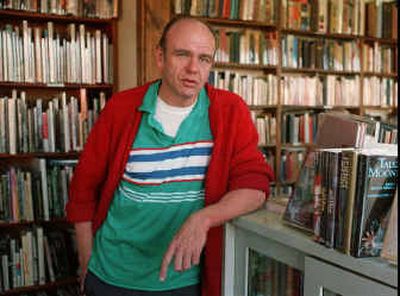Dunning writes of good books, murder

There are, says John Dunning, two lures to a collectible book.
One is monetary. The other is spiritual.
Dunning is familiar with both. A habitual book collector, he knows the business from both sides.
Once the owner of an antiquarian bookstore in Denver, Dunning is better known these days as the author of a series of mystery novels featuring an unusual protagonist: a former cop who not only fights like a professional but who can recognize the value of a first-edition copy of, say, Richard F. Burton’s “Pilgrimage to Medina and Mecca.”
Dunning, who will be in Spokane on Wednesday to read from his latest novel, “The Sign of the Book,” recalls a couple of years ago picking up a first edition of “The Grapes of Wrath.”
“It was a really, really nice copy,” he said during a recent phone interview. “That’s the spiritual connection – a book that you love to read, that you loved growing up. That kind of book.”
Mystery novels, at least the hard-boiled type, don’t always feature characters known for their softer sides. But they aren’t completely unknown, either. Robert B. Parker’s Spenser, for example, is a gourmet cook. Raymond Chandler’s Philip Marlowe relaxed by working out chess problems.
It’s that contrast that creates an intriguing complexity. And it is that very quality that embodies Dunning’s protagonist, Cliff Janeway. An ex-homicide cop who lost his job by resorting to a bit of vigilante justice with his fists, Janeway turned to his real love: books.
But he just couldn’t stay away from his other talent: hunting down killers.
Janeway has been the focus of four books now. In “The Sign of the Book” (Scribner, 368 pages, $25) he is asked by his business partner and, uh, close friend to look into a case. Seems a woman has been accused of killing her husband, and there might be some valuable books involved.
The added complication: The accused murderer was once close to Janeway’s friend, a lawyer named Erin d’Angelo, and the murder victim was once d’Angelo’s fiancé.
Pretty soon Janeway finds himself butting heads with a belligerent small-town deputy, on the trail of a trio of book thieves/shysters and, ultimately, facing the barrel of the real killer.
“This is the kind of thing Janeway fans love: juicy nuggets of bibliophile gold,” wrote Bill Ott, a reviewer for the literary journal Booklist. “That these tasty morsels come wrapped in serviceable crime plots involving tough guys, gutsy gals, and snappy patter makes the pleasure of devouring them all the sweeter.”
Not bad for a guy who doesn’t even have a high-school education.
“I have attention deficit disorder,” the 63-year-old Dunning explained. “This is a malady that wasn’t even known back then. … They didn’t have any patience with my kind of slowness.”
That was in Charleston, S.C., a city that plays a big part of the third Janeway novel, “The Bookman’s Promise.”
After earning a high-school equivalency degree, Dunning took off with a group of friends to Denver.
“There comes a point where you have to get away from your parents, if you’re going to do anything,” he said. “My mother and my father loved me dearly, but you can smother under that. And you can’t have your parents living your life for you.”
After doing a range of jobs, from working with race horses to cutting glass, he walked into the personnel office of the Denver Post, the biggest newspaper in Colorado, and asked for a job as a writer. He was put in the newspaper library, filing other people’s stories.
But he wanted more. So he was pointed toward the Post’s city editor – “5-feet-7, short guy, one of the toughest guys,” Dunning said – and handed him a story.
“I left it there, and four or five days later it was in the newspaper with my byline on it,” Dunning said.
From there, Dunning began his growth as a writer. He became an investigative reporter for the Post, but his hunger took him onward – to working as a radio host for more than 25 years, to working as a press aide for Congresswoman Pat Schroeder, to teaching journalism and critical writing, to owning and running his own bookstore, Denver’s Old Algonquin Bookstore (which closed in 1994).
Before he dreamed up the Janeway series, Dunning wrote five other published novels, among them two Edgar-nominated mysteries (“Looking for Ginger North,” “Deadline”) and a history of old-time radio (“Tune In Yesterday”).
But then, he says, he “hit a stone wall.”
“I was trying to sell another book and I couldn’t give it away,” Dunning said. “Publishers in New York just weren’t buying my stuff.”
The fallow period lasted nearly a full decade. Then he created Janeway, and things changed.
Not overnight, though. Several publishers passed on “The Sign of the Book.” It was only when his agent managed to interest an editor at Scribner’s that the Janeway series took off.
A first printing of 6,000 books sold almost immediately. First editions now sell for as much as $1,375.
Which brings us back to the money part. Those in the know can earn small fortunes. Those who aren’t, well … let Dunning illustrate:
“I walked into a yard sale one day, and there was a ‘Booked to Die’ first edition on the grass,” Dunning said.
“Now, I’ve got some of those,” he continued. “I don’t need another. But suddenly, there’s a $600 or $700 book sitting there on the grass.
“And I picked it up and I asked the woman, ‘Do you know what this sells for?’ And she said, ‘I don’t care what it sells for. It was lousy. I hated it.’ And I said, ‘What do you want for it?’ And she said, ‘Fifty cents.’ So I gave her the 50 cents and left.”
There’s a sense of irony in that story that’s almost … spiritual.